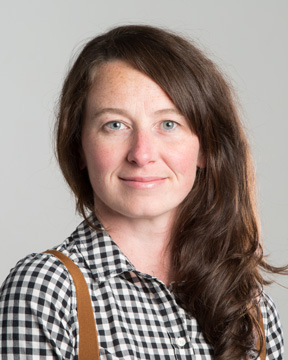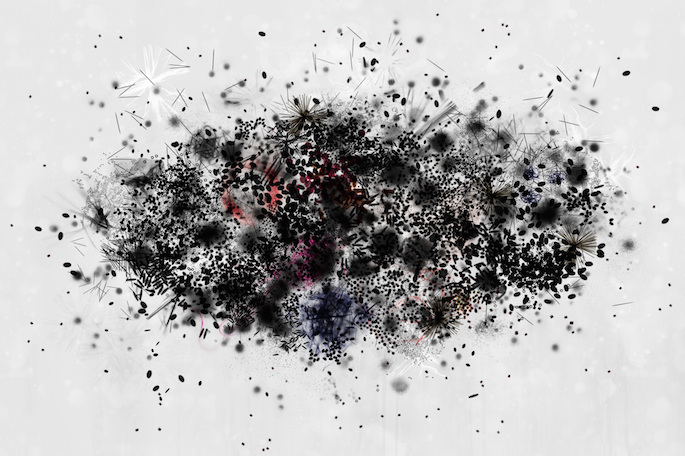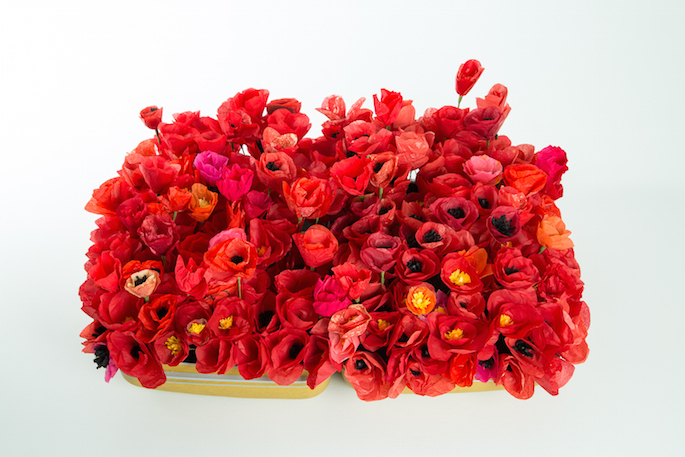Posted 3:58 p.m. Thursday, Jan. 28, 2016

UWL artist's photographs comment on a precarious environmental future.
Hawkes’ photographs comment on a precarious environmental future
One of the strengths of visual arts is the way it can communicate complexity, says Kate Hawkes, UWL assistant professor of art. Hawkes latest series of 12, large-scale photographic works captures the complex, overwhelming and disabling emotions that arise as people ponder the planet’s precarious environmental future. Her series of works, “Anthropocene,” literally means the present era during which humans are actively altering the global ecosystem. The art will be on display Feb. 8 - March 2 at the Paul Watkins Gallery at Winona State University. An opening reception will be from 4-6 p.m. Wednesday, Feb 10. The series was also featured in an exhibit Oct. 16-Nov. 24, 2015, at Gallery 19 in Chicago. [caption id="attachment_44847" align="alignleft" width="288"] Kate Hawkes[/caption]
The series was inspired by the Intergovernmental Panel on Climate Change report released in 2014, which Hawkes felt changed the public dialogue surrounding climate change from prevention to adaptation or mitigation.
“I wonder, how do we reconcile this fact?” she says. “Our future on this planet is dire and I wanted to make artwork about what this unique moment feels like.”
The works combine layers of photographed, massed-produced, disposable goods such as candy and cheap trinkets. The images create an alternate sense of space, depth and reality. Some items are clear and others are blurred. Some things resemble other things. This visual confusion is a metaphor for the emotional, conceptual and ethical confusion and turmoil surrounding climate change, she says.
“I think we are looking at an inevitable ending and we know it on some level, and that breeds a very complex anxiety,” she says.
Hawkes received a CLS small grant Spring 2015 for materials for “Anthropocene.” She also received a Southeastern Minnesota Arts Council (SEMAC) 2015 Individual Artist Grant to exhibit in Winona.
[caption id="attachment_44849" align="alignleft" width="685"]
Kate Hawkes[/caption]
The series was inspired by the Intergovernmental Panel on Climate Change report released in 2014, which Hawkes felt changed the public dialogue surrounding climate change from prevention to adaptation or mitigation.
“I wonder, how do we reconcile this fact?” she says. “Our future on this planet is dire and I wanted to make artwork about what this unique moment feels like.”
The works combine layers of photographed, massed-produced, disposable goods such as candy and cheap trinkets. The images create an alternate sense of space, depth and reality. Some items are clear and others are blurred. Some things resemble other things. This visual confusion is a metaphor for the emotional, conceptual and ethical confusion and turmoil surrounding climate change, she says.
“I think we are looking at an inevitable ending and we know it on some level, and that breeds a very complex anxiety,” she says.
Hawkes received a CLS small grant Spring 2015 for materials for “Anthropocene.” She also received a Southeastern Minnesota Arts Council (SEMAC) 2015 Individual Artist Grant to exhibit in Winona.
[caption id="attachment_44849" align="alignleft" width="685"] Some of the works from “Anthropocene” are loose metaphors and others are very direct. Hawkes' piece “Shade Reservoir” is based on Los Angeles reservoirs being covered with small black balls to prevent water from evaporating. You can see the black balls from space.[/caption]
Hawkes says maintaining a professional exhibition practice directly informs her teaching because the goal for students is to become professional artists who exhibit their works publicly. “Each body of work and each exhibition presents its own set of unique challenges — no two are the same,” she says. “So, the more experiences I have, the more I am able to share and help my students think through their own exhibitions and studio practice.”
Visit Kathleen Hawkes artist website.
Some of the works from “Anthropocene” are loose metaphors and others are very direct. Hawkes' piece “Shade Reservoir” is based on Los Angeles reservoirs being covered with small black balls to prevent water from evaporating. You can see the black balls from space.[/caption]
Hawkes says maintaining a professional exhibition practice directly informs her teaching because the goal for students is to become professional artists who exhibit their works publicly. “Each body of work and each exhibition presents its own set of unique challenges — no two are the same,” she says. “So, the more experiences I have, the more I am able to share and help my students think through their own exhibitions and studio practice.”
Visit Kathleen Hawkes artist website.
Another UWL faculty exhibit in Winona
 An exhibition “Thousands of Poppies” will also be on display in the Weber Gallery (in the same building as the Watkins Gallery) from Feb 8 - 16, with an opening reception also on Feb 10. This exhibition includes a collaborative installation of thousands of tissue paper poppies made by UWL faculty: Misha Bolstad, Art; Kathleen Hawkes, Art; and an animation of poppies by Karl Kattchee, Math. The two Winona exhibits have similar themes of excess, obsession, envisioning possible futures — possibly even science fiction, says Hawkes.
An exhibition “Thousands of Poppies” will also be on display in the Weber Gallery (in the same building as the Watkins Gallery) from Feb 8 - 16, with an opening reception also on Feb 10. This exhibition includes a collaborative installation of thousands of tissue paper poppies made by UWL faculty: Misha Bolstad, Art; Kathleen Hawkes, Art; and an animation of poppies by Karl Kattchee, Math. The two Winona exhibits have similar themes of excess, obsession, envisioning possible futures — possibly even science fiction, says Hawkes.
